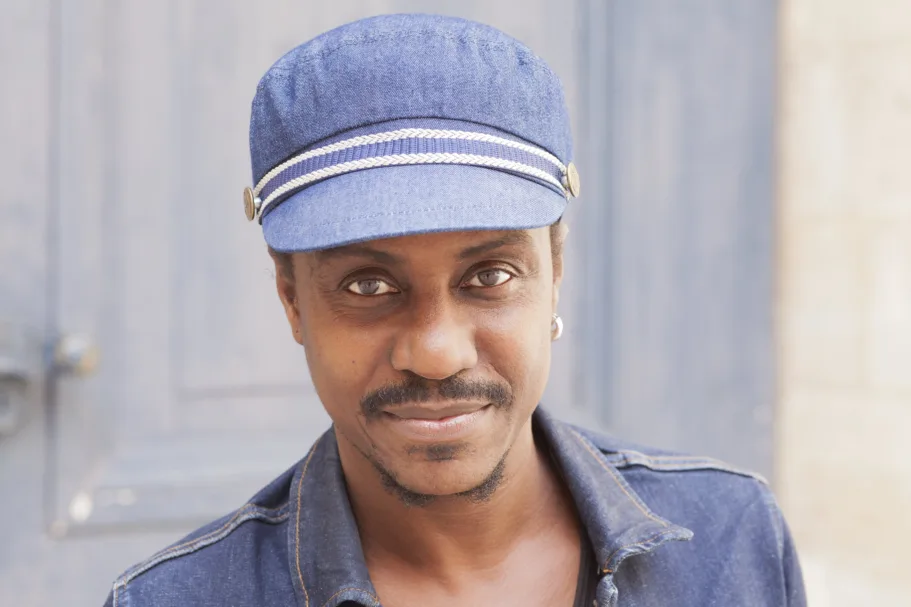L’amour telle une cathédrale ensevelie: conversation with Guy Régis Jr
Author and director of the Haitian opera-theatre L’amour telle une cathédrale ensevelie, presented at the PuSh Festival on February 3 and 4, Guy Régis Jr is above all a polymorphous creator. A writer, poet, playwright, actor and video artist, he works actively to promote the living arts in Haiti with his company NOUS Théâtre. In L’amour telle une cathédrale ensevelie, he draws on his own family history to explore the many departures from an abandoned land towards a better life.
Cory Haas, Artistic and General Director of Théâtre la Seizième, had the opportunity to chat with Guy Régis Jr at Zones Théâtrales in Ottawa.
Cory Haas – The work of your company NOUS Théâtre reflects the sociological, economic, and political questioning of the company’s members. How do you deal with these topics, from a dramaturgical point of view? Where do you start when you have the idea to tackle these topics?
Guy Régis Jr – These are topics that are part of several texts I write, whether they are plays, novels, (…) and they have always interested me. I think I decided to write because there were these things to say. I come from Haiti. [In] the places I go through, there are certain difficulties. In any case, I didn’t choose to write because I wanted to write literature; I decided to write because I thought I had something to say on certain topics, whether local or global.
Cory – So, once you have an idea, do you develop the material, or do you work with the artists to develop that material?
Guy – I’m a writer at core, I write the piece, I write the text. I take my time because I do several jobs and I use several mediums, whether it’s on stage, the actors, my writing, images… So I write. When I write, I write. I devote a certain amount of time to it, far removed from the performance. Then, a few months later, when I am lucky enough for it to be staged, I work with the actors. (…) I think I have so much respect for directing [because] it’s the first thing I learned in theatre. There are forms I really like to use [like] expressionism; there is work on gestures, on expressions, (…) on the body, on the voice, which is extremely important because the texts are a little poetic, sung. I’ll call in other designers: video technician, videographer, lighting designer, sound designer, visual artist, painter. And then I edit. That’s the working process.
Cory – L’amour telle une cathédrale ensevelie sits somewhere between theatre and opera, with music by Amos Coulanges and a performance by Nathalie Vairac. We get a glimpse of the cathartic scope of Greek theatre. Why this register for this story?
Guy – I would like to come back to what I said: a very strong attachment to texts. I find the theatre that originated in the West (…) extremely important and beautiful, powerful in space. But in the context of a country like Haiti or even certain African countries, the griots (in sub-Saharan Africa, members of the traveling poet-musician caste, the repositories of oral culture and reputed to be in touch with the spirits, editor’s note), the voices, are also very important. I come from a land of writing. You can say poems all day long, with music, it’s something natural in Haiti, you put on a guitar, a drum and then you say poems and it’s a show. I have always wanted to work in a form like that. Since I was a child, I have been rocked by Amos’s music; we all know Amos’s music. And when I wrote this text, there was something essential in the fact that what happens on the sea had to take another form. I often think that if people are at sea and they’re all going to die together, maybe they would sing? In Haiti, when the earthquake struck on January 12, 2010, people sang all over the city.
Cory – Where does the spectator fit into your work, how do you perceive their role?
Guy – Reception is the most important thing. We write, we direct, we perform because we want to reach out to people. I create for the encounter, for that beautiful rendezvous where we say something to them, where we challenge them. (…) I run a festival in Haiti [the 4 Chemins festival, editor’s note]. We bring the city together around the theatre, around the show. That’s how I got into theatre, by taking to the streets for free. Because for me, there is an urgency to talk to people. (…) And then, with great success, the town is transforming, the show turns into a political demonstration and the next day, we have to take a stand against the government. (…) So for me, theatre is extremely serious. It’s this serious convocation with the citizen that creates this desire to perform, and so the reception is extremely important, yes. (…) This theatre of the city is very political because we have the chance to summon, it’s extraordinary. Not everyone can summon people easily.
Cory – This is the first time L’amour telle une cathédrale ensevelie performs in Canada, how do you think the show will be received here?
Guy – I think the show is made for here. Because the retired husband is Canadian, and this is one of the largest Haitian communities in the world. (…) The fact that I’m playing here is to be able to talk about migration. This is a country with a great history of mixing peoples. I’ve learned that there are over 600 reserves here, and what happens on the reserves is not great. So, all this mixing of populations, people who were already there being invaded, others arriving afterwards, that’s human displacement. And the story of how we inhabit the land is extremely important to me. This show tells that story, and I hope it will encourage us to discuss that question again.
The full conversation is part of a PuSh Play podcast and is available on the PuSh Festival’s website and on Spotify.
L’anour telle une cathédrale ensevelie is co-presented by Théâtre la Seizième and PuSh International Performing Arts Festival, in partnership with SFU Woodward’s Cultural Program. Performances will be on February 3-4, 2024, at SFU Goldcorp Centre for the Arts. All performances will be surtitled in English.
Tickets sale through the PuSh Festival.
Information about the show and show-related activities on the show page.

